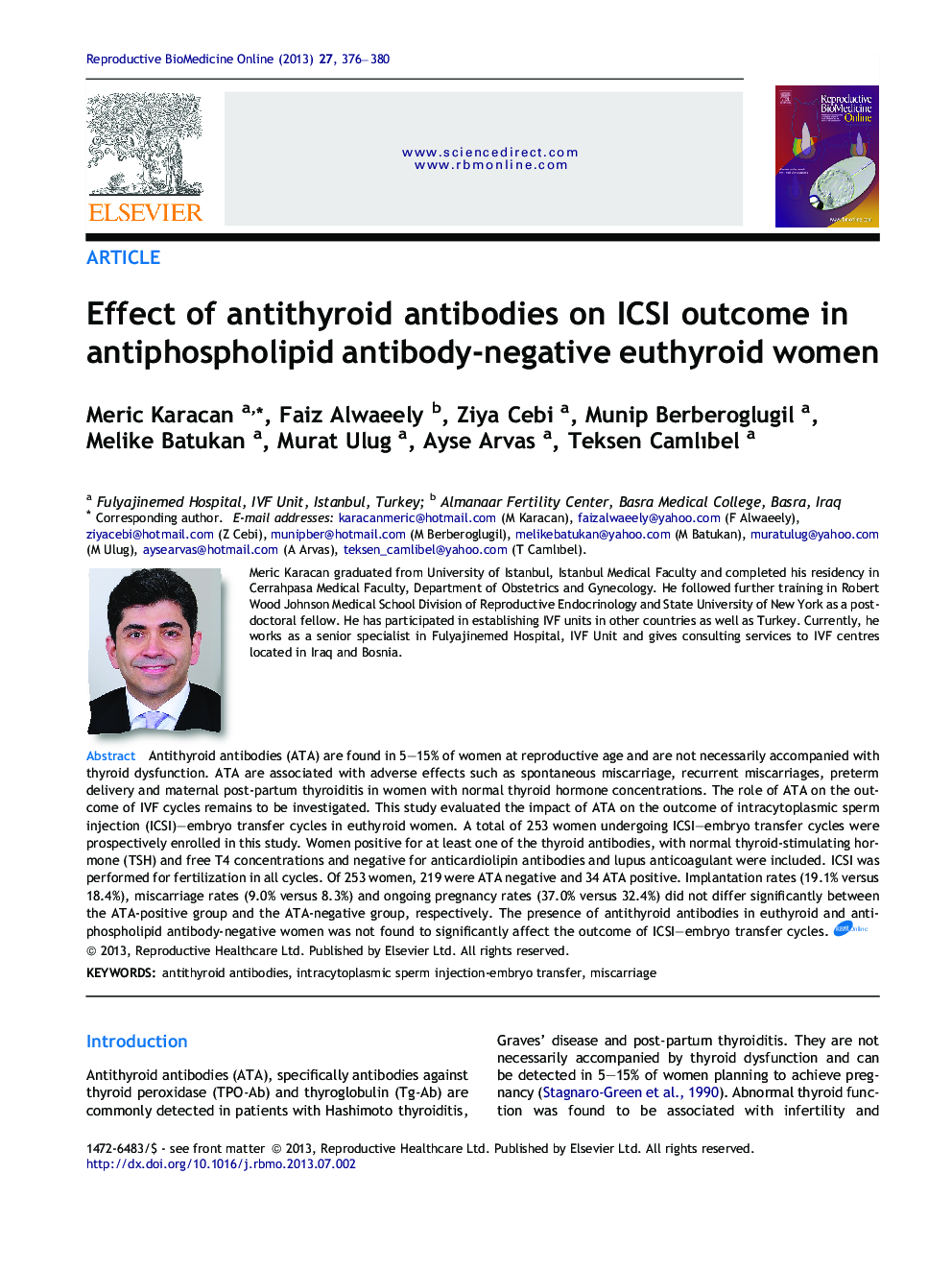| Article ID | Journal | Published Year | Pages | File Type |
|---|---|---|---|---|
| 3970243 | Reproductive BioMedicine Online | 2013 | 5 Pages |
Antithyroid antibodies (ATA) are found in 5–15% of women at reproductive age and are not necessarily accompanied with thyroid dysfunction. ATA are associated with adverse effects such as spontaneous miscarriage, recurrent miscarriages, preterm delivery and maternal post-partum thyroiditis in women with normal thyroid hormone concentrations. The role of ATA on the outcome of IVF cycles remains to be investigated. This study evaluated the impact of ATA on the outcome of intracytoplasmic sperm injection (ICSI)–embryo transfer cycles in euthyroid women. A total of 253 women undergoing ICSI–embryo transfer cycles were prospectively enrolled in this study. Women positive for at least one of the thyroid antibodies, with normal thyroid-stimulating hormone (TSH) and free T4 concentrations and negative for anticardiolipin antibodies and lupus anticoagulant were included. ICSI was performed for fertilization in all cycles. Of 253 women, 219 were ATA negative and 34 ATA positive. Implantation rates (19.1% versus 18.4%), miscarriage rates (9.0% versus 8.3%) and ongoing pregnancy rates (37.0% versus 32.4%) did not differ significantly between the ATA-positive group and the ATA-negative group, respectively. The presence of antithyroid antibodies in euthyroid and antiphospholipid antibody-negative women was not found to significantly affect the outcome of ICSI–embryo transfer cycles.Antithyroid antibodies (ATA) can interact with thyroid hormone receptors located on the human oocyte and impair the chance of fertilization and healthy pregnancy. They are found in 5–15% of women at reproductive age and are not necessarily accompanied with thyroid dysfunction. ATA have been reported to be associated with adverse effects such as spontaneous miscarriage, recurrent miscarriages, preterm delivery and maternal post-partum thyroiditis in women with normal thyroid hormone concentrations. The role of ATA on the outcome of IVF cycles remains to be investigated. The objective of our study was to evaluate the impact of ATA on the outcome of intracytoplasmic sperm injection (ICSI)–embryo transfer cycles in euthyroid women. A total of 253 women undergoing ICSI–embryo transfer cycles were prospectively enrolled in this study. Women with at least one of the thyroid antibodies positive and normal TSH and free T4 concentrations were included in the study. Since other immunological disorders might affect the results, antiphospholipid antibodies (APA), which are the markers of antiphospholipid antibody syndrome, were also screened in all women prior to study. Women with positive for APA were excluded in the final analysis. Of 253 women, 219 (86.6%) were ATA negative and 34 (13.4%) ATA positive. Implantation rates (19.1% versus 18.4%), biochemical pregnancy rates (9.2% versus 14.3%), miscarriage rates (9.0% versus 8.3%) and ongoing pregnancy rates (37.0% versus 32.4%) did not differ significantly between the ATA-positive group and the ATA-negative group, respectively. In conclusion, presence of antithyroid antibodies in euthyroid and antiphospholipid antibody-negative women does not affect the outcome of ICSI–embryo transfer cycles.
